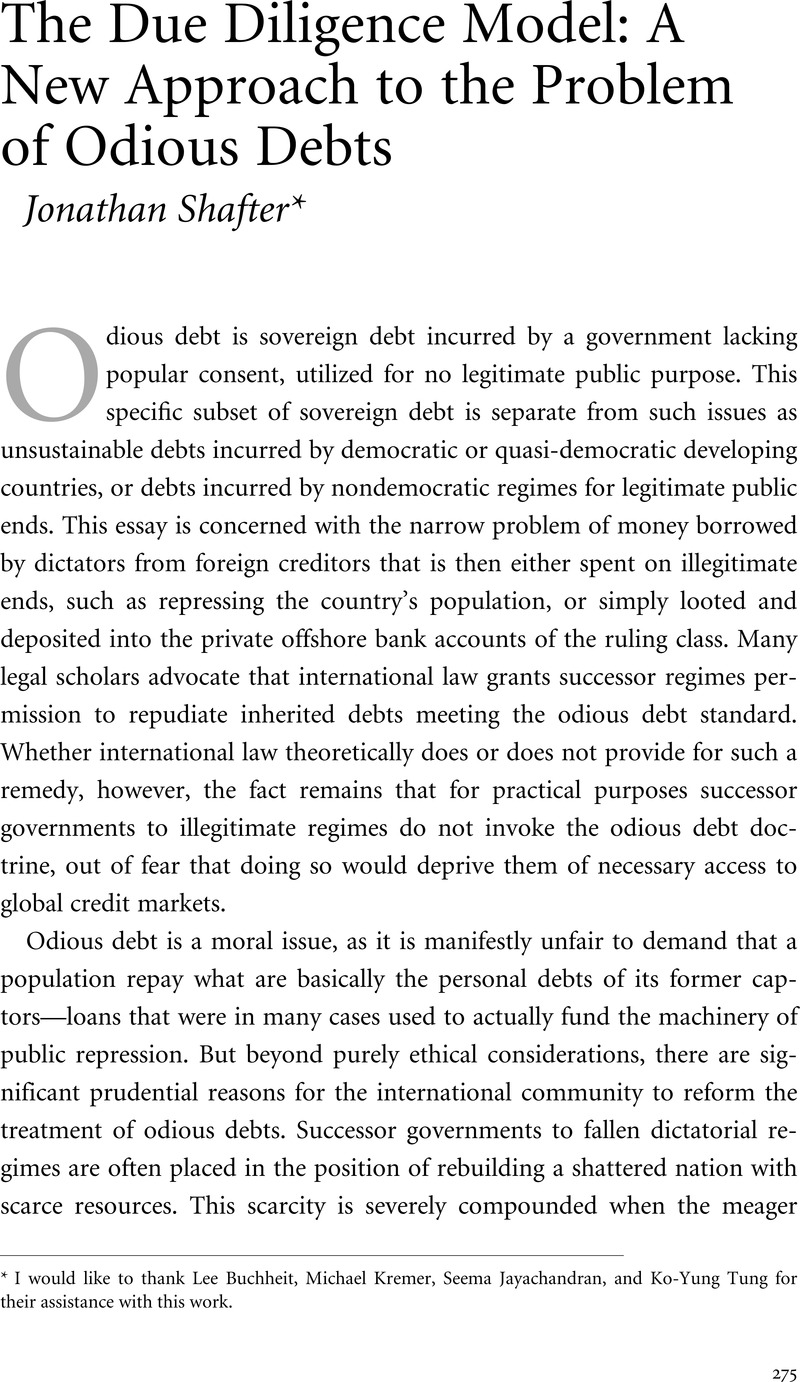No CrossRef data available.
Article contents
The Due Diligence Model: A New Approach to the Problem of Odious Debts
Published online by Cambridge University Press: 25 March 2011
Abstract

- Type
- Part IV: International Policy Reforms
- Information
- Ethics & International Affairs , Volume 21 , Issue S1: Dealing Fairly with Developing Country Debt , November 2007 , pp. 275 - 295
- Copyright
- Copyright © Carnegie Council for Ethics in International Affairs 2007
References
Notes
1 Two important contributions in this literature are Thomas Pogge, “Achieving Democracy, ” this volume, pp. 249–73; and Ashfaq Khalfan, Jeff King, and Bryan Thomas, “Advancing the Odious Debt Doctrine” (Quebec: Centre for International Sustainable Development Law, 2003). See also Anna Gelpern, “What Iraq and Argentina Might Learn From Each Other, ” Chicago Journal of International Law 6, no. 1 (2005), p. 391; Kevin Anderson, “International Law and State Succession: A Solution to the Iraqi Debt Crisis?” Utah Law Review 2 (2005), p. 401; and Anupam Chander, “Odious Securitization, ” special issue, Emory Law Journal 53 (2004), p. 923.
2 See Seema Jayachandran and Michael Kremer, “Odious Debt, ” American Economic Review, March 2006.
3 See Lee C. Buccheit, G. Mitu Gulati, and Robert B. Thompson, “The Odious Debts of an Odious Regime: Piercing the Governmental Veil, ” Duke Law Journal(forthcoming).
4 Admittedly without extensive empirical investigation, it is unlikely that there are many other policy initiatives for which Joseph Stiglitz and Oxfam on one side, and the Cato Institute and Heritage Foundation on the other, would unite in advocating. See Joseph Stiglitz, “Odious Rulers, Odious Debts, ” Atlantic Monthly 292, no. 4 (November 2003), pp. 39–45; Patricia Adams, “Iraq's Odious Debts, ” Policy Analysis 526, Cato Institute, Washington, D.C., September 28, 2004; Nile Gardner and Marc Miles, “Forgive the Iraqi Debt, ” Executive Memorandum 871, Heritage Foundation, Washington, D.C., April 30, 2003; and Oxfam, “A Fresh Start for Iraq: The Case for Debt Relief, ” Oxfam Briefing Paper 48, Oxfam International, Washington, D.C., May 2003.
5 White House, “A National Security Strategy for a New Century” (December 1999), p. 2, available at clinton4.nara.gov/media/pdf/nssr-1299.pdf.
6 See Jayachandran and Kremer, “Odious Debt.”
7 Congressional Budget Office, “Paying for Iraq's Reconstruction, ” CBO Paper, prepared for the Senate Budget Committee and the House Budget Committee, January 2004, p. 13.
8 See Jayachandran and Kremer, “Odious Debt.”
9 One need only observe the fact that no matter what was thought of the merits of the Iraqi war, Saddam Hussein's regime had many more international friends prior to his fall than afterward. The same can be said for nearly any fallen authoritarian regime.
10 Jeff King, “The Doctrine of Odious Debt under International Law: Definition, Evidence and Issues Concerning Application, ” in Ashfaq Khalfan and Jeff King, eds., Odious Debt Doctrine in International Law and Policy(New York: Cambridge University Press, forthcoming).
11 Jacobellis v. Ohio, 378 U.S. 184 (1964).
12 Ibid.
13 King, “The Doctrine of Odious Debt under International Law.”
14 See Jayachandran and Kremer, “Odious Debt.”
15 In the case of a bond debt rather than bank credit, this monitoring role would be assigned to a servicer.
16 Procedures Utilized by the Division of Corporation Finance for Rendering Informal Advice, Securities Act Release No. 6253, 21 S.E.C. Docket 320 n. 2 (October 28, 1980).
17 It is true that determining whether a lender complied with its due diligence plan is to a limited degree an ex post decision, which raises the previously discussed issue of a potential institutional bias against creditors or debtors. Since, however, the scope of the institution's ex post inquiry will be limited to the empirical question of whether a creditor adhered to its set plan of due diligence rather than the more open-ended and subjective Classical Model questions of whether loans were made with proper public consent and for legitimate public purposes, the potential that creditor-debtor biases will significantly affect outcomes in this system is acceptably low.
18 One recent problem for advocates of responsible sovereign lending has been the emergence of lending nations with very different interests and worldviews from the traditional sources of developing world capital. For example, the president of the World Bank recently complained that Chinese banks were flouting social and environmental principles in their developing country lending activities. While China has full rights to make loans as it sees fit, other nations equally have the right to decide if a successor's repudiation of those loans is valid and thus should not be punished by curtailing access to fresh capital. Odious debt reform could give nations who believe in the importance of certain lending standards some leverage against perceived “rogue lenders” and alleviate pressure to engage in a regulatory race to the bottom since a critical mass of nations following such a policy would lower the ex ante risk-adjusted returns to nonparticipating creditors. That said, in cases where rogue lenders are driven more by geopolitical than economic incentives, it is unclear how much actual impact this would have.
19 See Jayachandran and Kremer, “Odious Debt.”
20 Extractive Industries Transparency Initiative, “EITI Principles and Criteria, ” available at eitransparency.myaiweb15.com/principlesandcriteria.htm.


